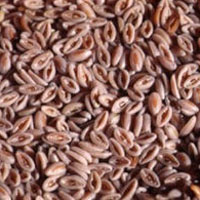Psyllium
 © Steven Foster
© Steven FosterParts Used & Where Grown
Psyllium is native to Iran and India and is currently cultivated in these countries. The seeds are primarily used in traditional herbal medicine. Psyllium seed husks are mainly used to treat constipation.
- Reliable and relatively consistent scientific data showing a substantial health benefit.
- Contradictory, insufficient, or preliminary studies suggesting a health benefit or minimal health benefit.
- For an herb, supported by traditional use but minimal or no scientific evidence. For a supplement, little scientific support.
Our proprietary “Star-Rating” system was developed to help you easily understand the amount of scientific support behind each supplement in relation to a specific health condition. While there is no way to predict whether a vitamin, mineral, or herb will successfully treat or prevent associated health conditions, our unique ratings tell you how well these supplements are understood by the medical community, and whether studies have found them to be effective for other people.
For over a decade, our team has combed through thousands of research articles published in reputable journals. To help you make educated decisions, and to better understand controversial or confusing supplements, our medical experts have digested the science into these three easy-to-follow ratings. We hope this provides you with a helpful resource to make informed decisions towards your health and well-being.
This supplement has been used in connection with the following health conditions:
| Used for | Amount | Why |
|---|---|---|
Constipation | 5 to 10 grams daily in water, followed by a second glass of water | Psyllium is a mild bulk-forming laxative that’s best suited for long-term use in people with constipation. |
Diverticular Disease | 7 grams daily in water, followed by a second glass of water | A preliminary trial found that psyllium, a good source of fibre, was effective in relieving the symptoms associated with diverticular disease and constipation. |
Elevated Cholesterol | 2 to 20 grams (about ½–4 teaspoons) per day with meals | Psyllium husk has been shown to be effective at lowering total and LDL-cholesterol levels. |
Irritable Bowel Syndrome | 3.25 grams taken three times per day | Some people with IBS may benefit from bulk-forming laxatives. Psyllium has helped regulate normal bowel activity and improved symptoms in some people with IBS. |
Type 2 Diabetes | 5 grams (about 1 teaspoon) twice daily with meals | Supplementing with psyllium has been shown to be a safe and well-tolerated way for people with type 2 diabetes to improve control of blood glucose and cholesterol levels. |
Diarrhoea | 9 to 30 grams daily | Psyllium seed (an excellent source of fibre) makes stool more solid and can help resolve diarrhoea symptoms. |
Haemorrhoids | 7 grams three times daily in water, followed by a second glass of water | Taking psyllium, a herb high in fibre, may help relieve constipation. |
Hypertriglyceridaemia | 15 grams daily | Psyllium seeds and husks have shown a modest ability to lower blood triglyceride levels in some clinical trials. |
Ulcerative Colitis | Refer to label instructions | Taking psyllium may help people with ulcerative colitis maintain remission. |
Parkinson’s Disease and Constipation | 3 to 5 grams taken at night with a one to two glasses of fluid | Preliminary research has shown that psyllium seed husks improve constipation and bowel function in people with Parkinson’s disease and constipation.
|
Traditional Use (May Not Be Supported by Scientific Studies)
In addition to its traditional and current use for constipation, psyllium was also used topically by herbalists to treat skin irritations, including poison ivy reactions and insect bites and stings. It has also been used in traditional herbal systems of China and India to treat diarrhoea, haemorrhoids, bladder problems, and high blood pressure.
Copyright © 2024 TraceGains, Inc. All rights reserved.
Learn more about TraceGains, the company.
The information presented by TraceGains is for informational purposes only. It is based on scientific studies (human, animal, or in vitro), clinical experience, or traditional usage as cited in each article. The results reported may not necessarily occur in all individuals. Self-treatment is not recommended for life-threatening conditions that require medical treatment under a doctor's care. For many of the conditions discussed, treatment with prescription or over the counter medication is also available. Consult your doctor, practitioner, and/or pharmacist for any health problem and before using any supplements or before making any changes in prescribed medications. Information expires December 2024.



 We are proud to announce that
We are proud to announce that  As the market evolves, customers increasingly request a wider variety of omega-3 options for their lipid...
As the market evolves, customers increasingly request a wider variety of omega-3 options for their lipid...  Maintaining healthy glucose levels is crucial for preventing metabolic conditions like diabetes,...
Maintaining healthy glucose levels is crucial for preventing metabolic conditions like diabetes,...  Looking at formulating a new vitamin blend? Discover
Looking at formulating a new vitamin blend? Discover 







































